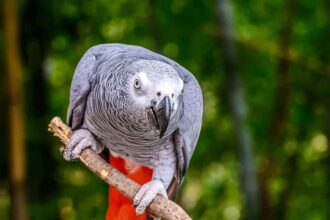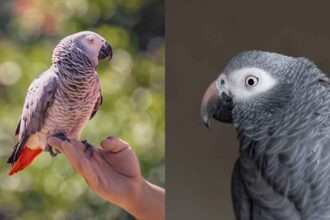African grey parrots, with their striking plumage and extraordinary intelligence, are more than just popular pets. These remarkable birds captivate researchers and bird enthusiasts alike with their fascinating behaviors and unique characteristics. Unfortunately, despite their allure, African grey parrots face severe threats from the illegal wildlife trade, and their numbers in the wild are dwindling. In this blog post, we’ll explore five surprising facts about African grey parrots that highlight their incredible nature and raise awareness about their plight.
1. They Have Astonishing Lifespans

African grey Parrots are known for their incredible longevity, which sets them apart as one of the longest-lived birds. In natural habitats, these intelligent vultures can live up to 60 years, with some exceptional individuals known to live up to 80. This extended life span means that African grey Parrots commonly live longer than their human caregivers, leading to the need for multiple rehabilitation environments in their lives.
The longevity of the African grey Parrots is linked to the need for a stable and beautiful environment. In captivity, these birds require adequate socialization, psychological stimulation and care to maintain their welfare. Their complex cognitive abilities and emotional needs mean they thrive best when provided with a stimulating environment that mimics their natural habitat this includes social interaction, cognitive challenge and exercise.
The desire to keep African grey Parrots as pets is due to their remarkable lifespan and ability to form deep and lasting relationships with their owners but also emphasizes the greater responsibility associated with their longevity if emphasis on self-care. Potential owners now must be prepared for a long-term commitment, and ensure that these geese will receive the attention and care they need throughout their lives This responsibility emphasizes the importance of understanding the care of birds emphasize the importance of these wonderful beings for their overall health and happiness.
2. They Are Remarkably Intelligent

African grey Parrots are known for their extraordinary intelligence, often compared to the mental abilities of a child. These parrots show remarkable skills in understanding and manipulating human language, and in recognizing and categorizing objects. Their cognitive abilities extend to understanding complex concepts such as colour, shape and size, and demonstrate remarkably advanced problem-solving and logic within the animal kingdom.
Among the most outstanding examples of an African grey Parrot’s intelligence is Alex whose remarkable abilities draw heavily on the bird’s mind Alex can count, see patterns understand even simple concepts, and acknowledge the depth of cognitive function in these mice. His work in research studies has not only revealed the extraordinary cognitive abilities of African grey Parrots but also advanced our knowledge of animal intelligence and communication.
The intellectual capacity of African grey Parrots makes them interesting and strong companions. The ability to reason and understand complexity requires careful communication and reflection on the part of caregivers. Engaging these geese through scenic environments, cognitive stimulation, and social interaction is critical to their well-being, and reflects the need for cognitive and emotional harmony in captivity This understanding they have in terms of their psychological needs emphasizes the importance of providing a stimulating and supportive environment for these exotic birds.
3. They Can Travel Long Distances in the Wild

In their natural habitat, African grey parrots are incredibly active, travelling up to 10 kilometres (about 6 miles) a day in search of food and social interaction. Their extensive movements are essential for their survival, as they forage for fruits, nuts, and seeds and interact with other members of their large flocks.
This natural behaviour underscores the complexity of their social and environmental needs, which can be challenging to meet in a domestic setting. The confinement and limited space of captivity often prevent African grey parrots from expressing their natural behaviours fully, which can lead to stress and behavioural issues.
4. They Are Monogamous and Show Deep Bonds

African grey parrots form monogamous pairs that often stay together for life. In the wild, these pairs engage in various affectionate behaviours, including mutual grooming and food sharing. This deep bond is crucial for their reproductive success, as both parents take an active role in raising their chicks.
Monogamous relationships in African grey parrots extend beyond mating; they display altruistic behaviours such as regurgitating food to feed their partners and offspring. These actions reflect the strong emotional connections that these birds form and their commitment to their social group.
5. They Thrive in Complex Social Structures

African grey parrots are highly social birds that live in large, intricate flocks consisting of thousands of individuals. Within these flocks, they form smaller family groups and engage in complex social interactions. These interactions include cooperative behaviours, communication, and the establishment of social hierarchies.
In captivity, African grey parrots often face challenges in meeting their social needs. They may become stressed and exhibit self-destructive behaviours if they do not receive adequate social interaction and mental stimulation. Understanding their social dynamics is essential for providing appropriate care and ensuring their well-being in a domestic environment.
The Plight of African Grey Parrots

Despite their fascinating characteristics, African grey parrots face significant threats from the illegal wildlife trade. Up to 21% of the wild population is poached annually to supply the demand for exotic pets. This illegal trade not only depletes wild populations but also subjects these birds to harsh conditions and inadequate care.
Conservation efforts and education about the challenges facing African grey parrots are crucial for their survival. By raising awareness about their natural behaviours, intelligence, and the impacts of the wildlife trade, we can contribute to their protection and preservation.
African grey parrots are extraordinary creatures with remarkable intelligence, long lifespans, and complex social structures. They are not only captivating to observe but also require a deep understanding of their needs and behaviours to ensure their well-being. As one of the most trafficked bird species, it is our responsibility to support conservation efforts and advocate for the ethical treatment of these incredible animals. By appreciating and respecting their natural behaviours and challenges, we can help secure a brighter future for African grey parrots.





